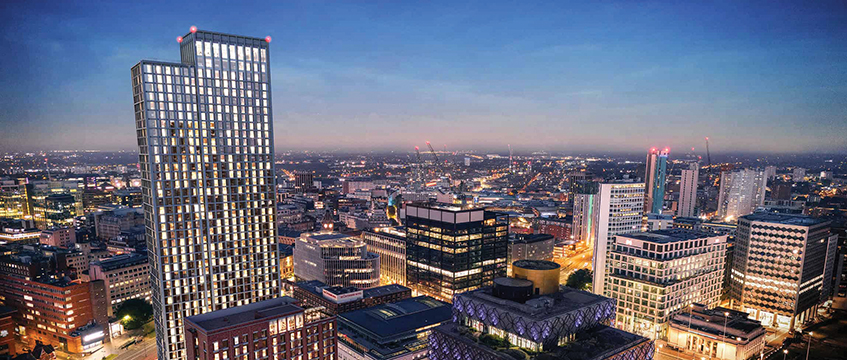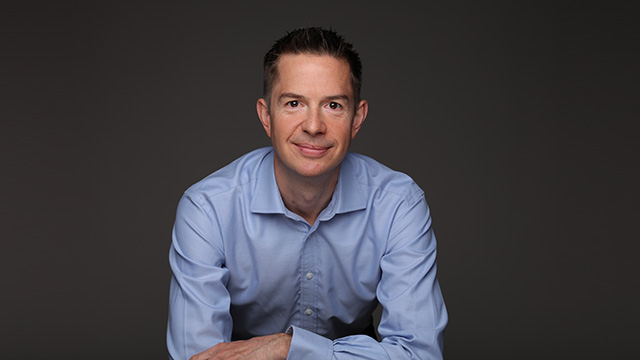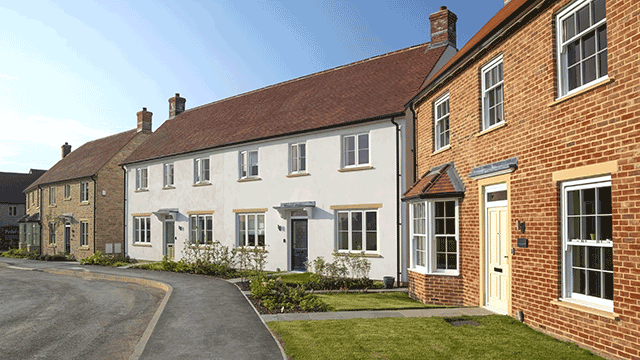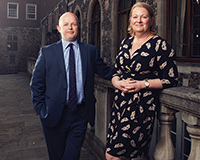The Church Commissioners’ investment fund has grown by 16% to £6.1bn over the past 12 months. Now it has plans to invest heavily in property, forestry and infrastructure. Katie Puckett met its surveying team
Joseph Cannon has worked for the Church Commissioners since 1987, Rosemarie Jones since 1988. But that’s the blink of an eye for a body that can trace its origins back to 1704. The commissioners has just reappointed its insurance broker of 25 years’ standing, has used the same mineral agent for 50 years, and one of its agricultural agents was appointed in the 19th century.
As the body that manages the Church of England’s substantial investments to provide a steady income for clergy pensions and to support its mission in local communities, “long term” is very much the theme for everything the Church Commissioners does. The church’s investments are on the opposite trajectory to its congregation numbers – during 2013, the fund grew by 15.9% to £6.1bn and paid out £208m. This is partly down to the strong performance of its £2bn of direct and indirect property investments, which are split across residential, commercial and land, and include the MetroCentre in Gateshead, Tyne and Wear, the Hyde Park Estate and the Pollen Estate in Mayfair, which is currently up for sale.
Cannon is chief surveyor, responsible for the property portfolio; Jones is deputy surveyor, focusing on the management of its direct investments in the residential, commercial and rural sectors.
“We are big believers in property,” says Cannon, who completed a bachelor of divinity degree at King’s College before joining the Church Commissioners, and would not be wholly out of place ministering to his own flock. “One of the features of land and property is that it’s enduring, so it is a very good investment fit for an organisation that thinks of its commitments in terms of decades rather than years.”
This lack of urgency, and the fact that all investments are equity- rather than debt-funded, gives the commissioners huge freedom, he adds. “As a historic endowment, we don’t have money pouring into the fund each month that we then need to get invested in certain assets regardless of where the market pricing might be.”
But freedom isn’t exactly the word that comes to mind for an organisation that is answerable simultaneously to parliament, the church’s General Synod and the Charities Commission, with a 27-strong board of governors and an asset committee of nine that includes the Bishop of Bristol.
It is also guided by an ethical investment advisory group to ensure that its property purchases and lettings are in keeping with the church’s mission. Not to mention the considerable public scrutiny and criticism that its investment decisions often draw. In May, protesters descended on Westminster Abbey criticising plans to build a retail park on church-owned land outside Leighton Buzzard in Bedfordshire.
Despite its commitment to property, the Church Commissioners is seeking to reduce its allocation from 34% to less than 30%, though Cannon says it will not go below 25%. The most efficient way to do this was felt to be through the disposal of the church’s 64% stake in the Pollen Estate, a substantial chunk of Mayfair including 43 buildings and more than 500,000 sq ft of offices. JLL is handling the sale and offers over £300m are expected. No further disposals are planned.
The church has already diversified significantly away from property after being badly burned in the 1980s. Then, its property allocation reached more than 60% of the total fund and it lost £800m on speculative deals in the UK and US. Now it takes a far more cautious approach. “We want to avoid ever having to take massive sudden steps, so we keep an eye on all of the allocations and just adjust those with more of a light touch,” says Cannon.
But it didn’t come out of the most recent recession completely unscathed: in 2010, the church wrote off its entire £40m investment in two New York housing estates when property firm Tishman Speyer handed the 11,000-home estates over to its creditors. Cannon points out that the overall portfolio has still performed well over the past decade – delivering a return of more than 10% pa, well above the IPD index – but that it now examines risk much more closely. “We are more careful about understanding the role of debt and borrowing within investments, and about market timing, where pricing sits within property cycles. If we are looking at a property fund investment, we will want to get a very good understanding of the proposed site, the debt and how that is sourced, whether it is a single loan or series of loans, the covenants attached to it and to think about future scenarios where we could potentially start to lose money on that investment and the contribution that different levels of debt would make to that.”
Now the church plans to diversify further into forestry and infrastructure, which currently comprise 2% and 1.7% of its portfolio respectively, and invest in its existing properties. One of its investment priorities is the Hyde Park Estate, where its London residential property is concentrated, bordered by Bayswater Road, Sussex Gardens and Edgware Road. “That might mean trying to buy back houses but also investing in the public realm, with green initiatives and signage,” says Jones.
While Cannon commutes from Brighton, Jones is a Clapham resident and staunch Londoner. “I have never understood why anyone wants to escape from London,” she says. “If I can’t see a red bus, I think there must be something wrong.” One of her pet projects is Connaught Village, a shopping and restaurant quarter at the heart of the estate. She is excited about two new lettings – to Japanese bar Kurobuta, run by Nobu’s former head chef, and an Argentine delicatessen, Abasto – and its upcoming summer festival, which will include street performers and a dog show. “We clearly can’t compete with the main West End and Oxford Street, so we are trying to create something a bit different in central London.”
Diversification inevitably brings challenges from an ethical point of view – last year, the church was revealed to be an inadvertent investor in high-interest loan company Wonga via a pooled fund. In its direct investments, it avoids tobacco, gambling, weapons, alcohol and human embryonic cloning. Cannon says that in the context of institutional portfolios, these issues come up “surprisingly rarely”. Gambling is the most common concern in property terms – a bingo hall or casino may form part of a development or fund.
It also monitors lettings. “The challenge with owning or investing in a property is that the leases are assignable, and if you put controls in place you will hit the investment value of the lease,” says Cannon. “Some years ago, there was an assignment to a user that we had difficulty with, but it was one small lease out of 100 leases on the property, so it was immaterial to the investment. If there was a major assignment to a user that conflicted with our ethical policy, we do have a framework in place to report it to our trustees and consider whether we dispose of the entire property.” The church also carries out thorough background checks of proposed tenants for its residential properties.
In terms of direct commercial investments, the commissioners avoid short-term positions in expensive markets. “We particularly like multi-let buildings outside of traditional prime central London – in areas like Midtown we feel we can refurbish over time, get to know our tenants and drive value that way,” says Jones.
“That’s not to say that we wouldn’t take some shorter-term positions, but generally that doesn’t meet with what we are setting out to do,” adds Cannon.
“We are looking to play to our strengths, to purchase and manage land where we may see the value in 30 to 50 years. There are not many property investors who can do that.”











